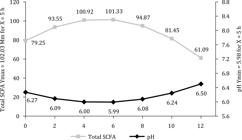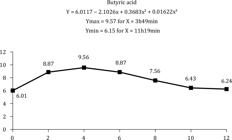ABSTRACT
The objective of this study was to evaluate the intake and ruminal parameters of goats fed diets supplemented with vegetable oils. Four rumen-cannulated Saanen goats were allocated to four treatments, which consisted of a control diet and diets with the inclusion of 30 g of canola, sunflower, or soybean oils per kilogram of diet dry matter (DM). The experiment lasted 40 days, which were divided into four 10-day periods. Forage intake was estimated using chromium oxide as an external marker, and supplement intake was determined as the difference between the daily amount supplied and orts. Rumen fermentation parameters were evaluated from samples of rumen fluid collected every 2 h, for 12 h. Rumen pH and short-chain fatty acid and ammonia nitrogen concentrations were measured. There was no effect of lipid supplementation on DM intake. Ether extract intake was highest in the treatments with oil inclusion, and the highest acid detergent fiber intake was obtained with the diet containing canola oil. The pH was highest in the group fed soybean oil and responded quadratically to the collection times. Total short-chain fatty acid and acetic acid concentrations also responded quadratically to the collection times. Propionic and butyric acid concentrations and acetic:propionic acid ratio showed a cubic behavior with the increasing collection times. Canola, sunflower, or soybean oils can be included at 30 g/kg of the diet DM as a strategy to increase the energy density of goat diets.
Capra hircus; fatty acids; fermentation; pH; rumen ammonia nitrogen

 Thumbnail
Thumbnail
 Thumbnail
Thumbnail
 Thumbnail
Thumbnail
 Thumbnail
Thumbnail
 Thumbnail
Thumbnail




